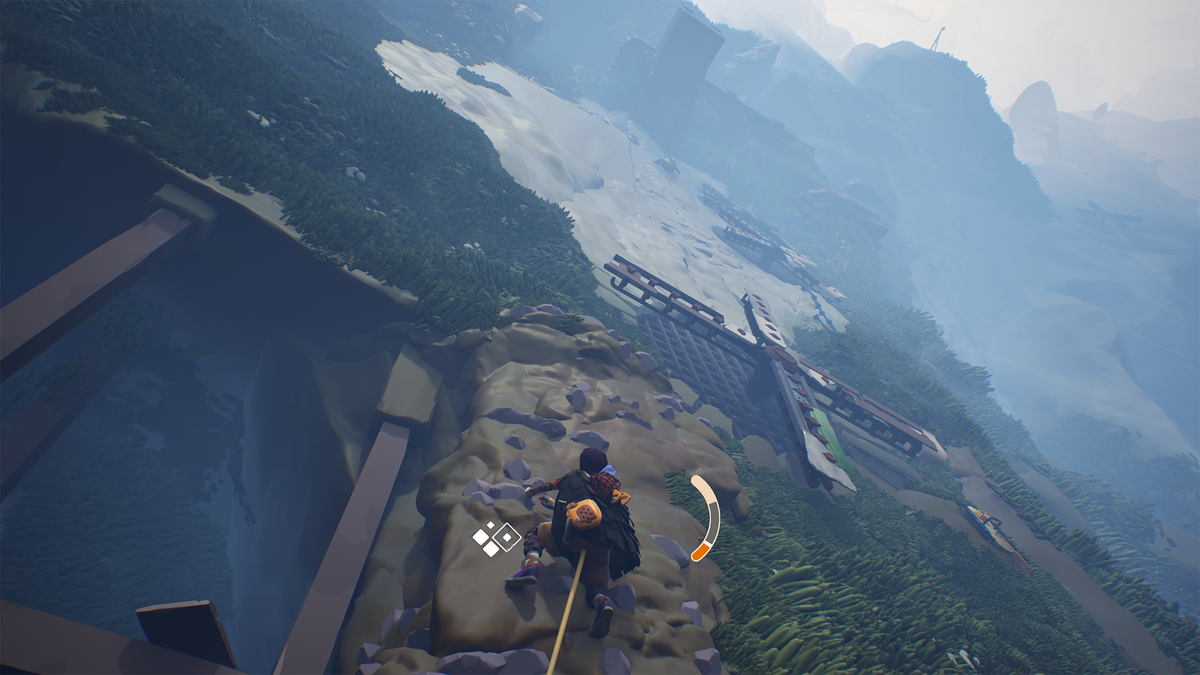In a vast desert, scattered with the eroded husks of long-dead boats, there stands a vast tower. The word “tower” doesn’t really cover it. Rectangular mountain? City-sized monolith? Vertical landscape? Whatever, our young hero, dressed in technical sports gear and a feathery, birdlike cape, walks toward it with determination. We’re going up.
This is Jusant, a gorgeous, meditative, quietly gripping climbing game from French developer Don’t Nod (Life Is Strange). It’s coming out on PlayStation 5, Steam, and Xbox Series X later this fall, with a day-one Game Pass release. I’ve played a demo encompassing the first few hours of Jusant, and it’s already one of my favorite experiences in a brilliant year for video games.
In French, the word “jusant” refers to an ebbing tide. In the game’s world, a civilization of people once lived on that tower of rock amid a huge, swelling sea, descending with the tide to fish and forage, then scampering back up. When the sea eventually dried up, the people descended the tower for good, and dispersed. Now, much later, our hero is retracing their path upward, picking through the remains of their lives, accompanied by a chirping little blob of a water creature that lives in the hero’s backpack and has resonant powers.
[embedded content]
The art uses a mixture of mountaineering and nautical motifs to conjure this mysterious people from their empty world. Everything is cracked and weathered, carved smooth by sea and air, richly hued and beautiful. You find notes as you climb, filling you in on the trivial moments of a society that might have been dying or being reborn as the sea withdrew — it’s hard to tell.
That’s the context, and it’s very atmospheric, especially as you turn onto a bleached cliff that faces the sun and feel the waves of heat radiating off it. The game itself is pure rock climbing: It’s you versus the wall, where every few yards is a pathing puzzle to solve. Don’t Nod has put together a wonderfully tactile suite of controls for Jusant, backed up by the fluid animation of the central figure. The left and right triggers are your left and right hand grips, and the left stick directs the reach of your arm to the next tiny handhold. You climb with a see-sawing motion, from trigger to trigger, hand to hand, eye searching out the next grip. It’s so satisfying.
Gradually, Don’t Nod layers on the complications without disturbing the pure, upward trajectory of Jusant. There’s a heart-in-mouth jump you get by holding and releasing the A button. At the start of every climb you clip your rope to a carabiner, and can add up to three pitons to any surface as you ascend. Eventually, you realize the pitons are like quick-save points that can catch you if you miss a leap, but they also open up other possibilities, like rappelling, wall-running, and swinging. This won’t be news to any actual climbers, but your rope is everything.

A little further up, environmental interactions and puzzles start to appear; your cute blob companion (called Ballast) can bring plants to life, opening new paths — but on sunward surfaces these plants wither after a short time, and your stamina drains quicker, too. This is a relaxing game, but it still has bite sometimes. It also has mystery, with secret, alternative paths yielding collectible clues to the past of this strange civilization.
But it wasn’t Jusant’s secrets or its challenges that I really vibed with. It wasn’t even its simple but effective climate allegory. Like the very different Dorfromantik did last year, its minimalism cleared my mind. In a year in which more has so often turned out to be more, this game is less. All it really gives you is one brilliantly executed control scheme, and one direction to head in: up.
- SEO Powered Content & PR Distribution. Get Amplified Today.
- PlatoData.Network Vertical Generative Ai. Empower Yourself. Access Here.
- PlatoAiStream. Web3 Intelligence. Knowledge Amplified. Access Here.
- PlatoESG. Automotive / EVs, Carbon, CleanTech, Energy, Environment, Solar, Waste Management. Access Here.
- PlatoHealth. Biotech and Clinical Trials Intelligence. Access Here.
- ChartPrime. Elevate your Trading Game with ChartPrime. Access Here.
- BlockOffsets. Modernizing Environmental Offset Ownership. Access Here.
- Source: https://www.polygon.com/23843388/jusant-dont-nod-climbing-preview



